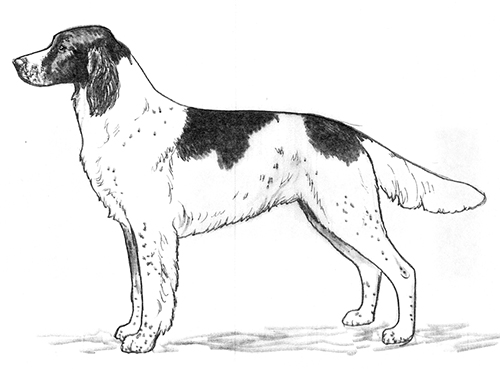Epagneul Francais (French Spaniel)
Gun Dog Group
The goals and purposes of this breed standard include: to furnish guidelines for breeders who wish to maintain the quality of their breed and to improve it; to advance this breed to a state of similarity throughout the world; and to act as a guide for judges.
Breeders and judges have the responsibility to avoid any conditions or exaggerations that are detrimental to the health, welfare, essence and soundness of this breed, and must take the responsibility to see that these are not perpetuated.
Any departure from the following should be considered a fault, and the seriousness with which the fault should be regarded should be in exact proportion to its degree and its effect upon the health and welfare of the dog and on the dog’s ability to perform its traditional work.
History
The French Spaniel is a descendant of the bird dogs used in the Middle Ages. The diverse varieties of hunting spaniels are descended from this breed. Through careful selection, the French Spaniel developed into an elegant and athletic pointing breed.
The Epagneul Francais was recognized by the United Kennel Club January 1, 1996.
General Appearance
Medium sized, well balanced, elegant and well muscled, with strong but not coarse bone.
Fault: Fine bone.
Characteristics
Soft, calm and docile, the French Spaniel is an enthusiastic hunter, sociable with other animals and an ideal companion. He is an excellent pointing and retrieving dog.
Head
The head is of medium length and width, not heavy, and is carried proudly.
SKULL
The skull is the same width from the ear to the eye. The superciliary arches are marked. In profile, the planes of the skull and the muzzle are slightly divergent.
Fault: Skull too broad.
MUZZLE
A little shorter than the skull. A slightly convex nasal bridge is preferred to a straight one. The upper lip falls vertically from the nose, and covers the lower jaw but is not pendulant.
Fault: Muzzle too short.
TEETH
The Epagneul Francais has a complete set of evenly spaced, white teeth meeting in a scissors or level bite.
Disqualifications: Overshot or undershot.
NOSE
Well pigmented, with wide open nostrils.
EYES
Quite large and oval in shape, dark amber in color, expressing softness and intelligence. The eyerims fit tightly.
Fault: Light eyes.
EARS
The ears are set well back on the head at eye level. Pulled forward, the tip reaches just to the nose. The ears are well covered with wavy, silky hair down to the rounded tips.
Neck
Oval in shape, slightly arched, and without dewlap.
Forequarters
The shoulder blade is well attached and laid back at an angle of about 50 degrees. The upper arm is angled at about 60 degrees.
FORELEGS
The legs are straight, lean and muscular, and furnished with wavy, silky hair. The pastern joint is well defined and lean, and the pastern is slightly sloping.
Body
The body is longer than tall, fitting into a rectangle. The chest is deep and round, with a well developed forechest. The withers are quite high, lean and broad, and there is a slight downward slope from the withers to the topline, which is straight and firm in action. The loin is broad and powerful, and the croup is rounded and without any bony outline. The underline is slightly tucked up towards the belly.
Hindquarters
Seen from behind, the hindquarters are vertical, with powerful, well muscled limbs.
HIND LEGS
The thighs are long, broad and well angulated. The hock joint is solid and strong.
Feet
Oval, with tight, well arched toes and firm pads.
Tail
The tail is set below the topline, falls obliquely, and is curved like a saber. It is strong at the root, tapers toward the tip and reaches to the hock joint. It is furnished with long, wavy, silky fringes that get longer to the center part and then taper in length to the tip.
Coat
The coat is long and wavy on the ears, legs and tail. It is flat and silky on the body and short and fine on the head.
Faults: Curly hair on the body. Lack of furnishings.
Color
White and brown in irregular patches, with or without ticking and roaning. The brown varies from cinnamon to dark liver. A white blaze on the head is appreciated but its absence is not a fault. The pigment of all outer mucous membranes is brown.
Fault: White surrounding the eyes.
Disqualification: Any color other than white and brown.
Height
Height at the withers for males is 22 to 24 inches. For females, it is 21.5 to 23 inches. There is a tolerance of up to one inch over the recommended size.
Gait
Easy, supple, energetic and elegant, with no exaggerated lift of the legs, and no rolling of the body.
Eliminating Faults
(An Eliminating Fault is a Fault serious enough that it eliminates the dog from obtaining any awards in a conformation event.)
Size outside the limits of the standard.
Disqualifications
(A dog with a Disqualification must not be considered for placement in a conformation event, and must be reported to UKC.)
Unilateral or bilateral cryptorchid.
Viciousness or extreme shyness.
Albinism.
Overshot or undershot.
Any color other than white and brown.

Looking for a Dog?
Find a dog that will fit your family.
Note: The breeders on this list are not endorsed by UKC.
Revised July 1, 2009
©Copyright 1996, United Kennel Club
